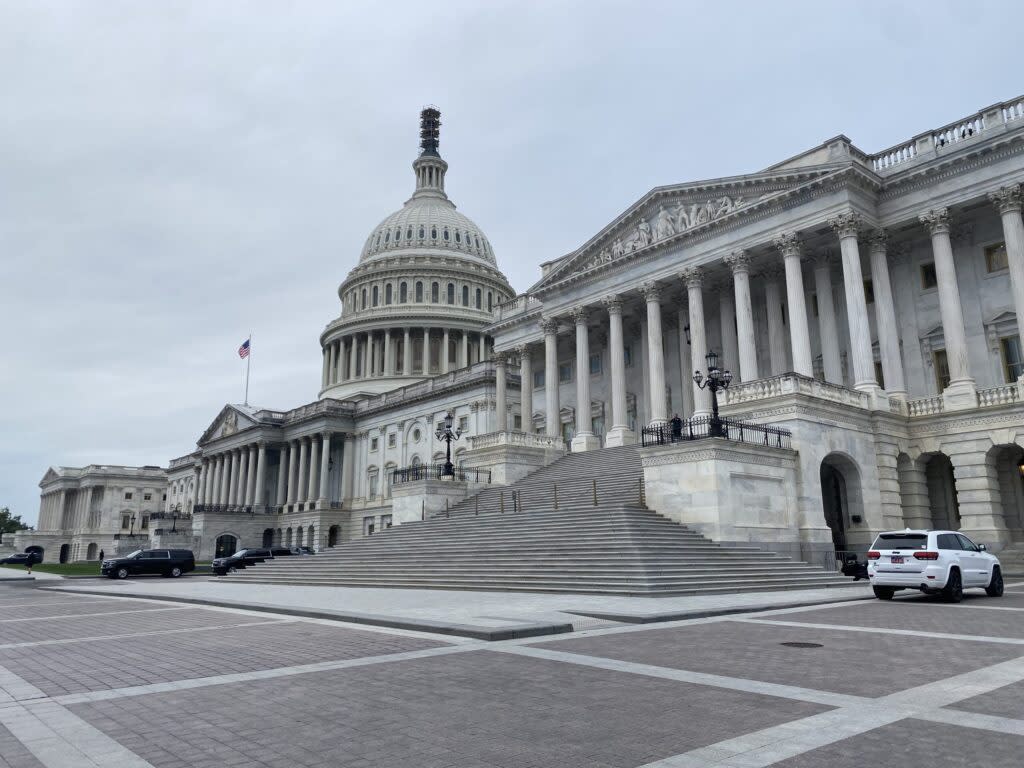U.S. House GOP spending cuts a preview of Project 2025, lead Dem appropriator says

- Oops!Something went wrong.Please try again later.
The leading Democrat on the U.S. House Appropriations Committee on Tuesday highlighted the spending cuts proposed by House Republicans in fiscal 2025 appropriations bills. (Photo by Jennifer Shutt/States Newsroom)
Policy, politics and progressive commentary
The cuts to labor, health care and education proposed in a U.S. House Republican bill this week are previews of what would happen to federal agencies under a second Trump term, a key House Democrat said Tuesday.
Rep. Rosa DeLauro of Connecticut, the ranking member of the House Appropriations Committee, told reporters Tuesday that the major spending cuts in Republicans’ fiscal 2025 proposal to fund the departments of Labor, Health and Human Services, and Education would have significant impacts on workers, families and students.
The bill would cut the Labor Department budget by 22%, the HHS budget by 6%, and the Education Department by 14%.
DeLauro referenced Project 2025, the policy blueprint for a possible second Trump presidency, saying Republicans are already trying to implement the policies through spending bills.
“What we’re going to do as Appropriations (Democrats) is look at that Project 2025 and the appropriations bills and look at what they are already trying to move forward through the appropriations process,” she said at a Tuesday press conference.
She also pointed out Republican leaders’ inability to pass spending bills, referring to the narrowly avoided government shutdown in September and a failed vote on the Legislative Branch spending bill this month.
“They cannot govern,” she said. “This is chaos.”
Rep. Robert Aderholt, an Alabama Republican who is chairman of the Labor, Health and Human Services and Education Appropriations Subcommittee, called the proposed budget cuts “common sense reforms” that would “ultimately save taxpayer dollars” in a press release earlier this month after the House Appropriations Committee approved the bill.
House Appropriations Chairman Tom Cole, of Oklahoma, said in a statement that the legislation would protect Americans from policies championed by President Joe Biden, which are largely opposed by congressional Republicans.
“Importantly, the bill reins in the Biden Administration’s burdensome overreach and divisive policy agenda,” Cole said.
Huge cut to Labor
The legislation proposes major cuts in federal funding for labor programs. It would decrease the Department of Labor’s budget by $3 billion from current levels.
Fred Redmond, the secretary-treasurer of AFL-CIO, a national labor coalition, highlighted the elimination of $900 million for youth job training programs, saying it took away a program “at the exact moment that young people are looking for good, stable jobs.”
He also criticized Republicans for pushing a pro-worker narrative at last week’s Republican National Convention.
“We know it was all just talk,” he said. “This is the platform. No matter how many different ways they tried to dress it up in Milwaukee, this is what they want to do.”
The legislation would make a nearly 12% cut to the Occupational Safety and Health Administration, which enforced workers safety regulations. If the bill is enacted, OSHA would receive $75 million less than the current fiscal year.
Reproductive health funding targeted
Speakers at DeLauro’s event also highlighted the bill’s impacts for health care, especially reproductive care.
Kimberly Diaz Scott, the vice president of National Family Planning and Reproductive Health Association, a group that advocates for family planning providers, said the funding bills are “a laundry list of attempts” to take away Americans’ access to reproductive health care.
The legislation would decrease funding to the Department of Health and Human Services by just over 6%, or $7.5 billion, from current levels.
The bill would cut over $280 million for Title X Family Planning that provides funding to help people access contraception, pregnancy testing and counseling, and sexually transmitted infection services. It is designed to provide access to these services for those with low-incomes or who are uninsured.
Republicans have targeted the program, which provides funding for reproductive care clinics including Planned Parenthood, for decades.
Scott emphasized that the elimination of these programs would especially affect communities that face difficulty accessing these services.
“These attacks are part of a larger agenda to roll back the progress we have made toward gender equality,” she said. “Each of these policies seek to control and limit bodily autonomy, to deny people the right to make their decisions about their own bodies and their own lives.”
The legislation would also cut Centers for Disease Control and Prevention spending by $1.8 billion, eliminating funding for research focused on preventing suicide, firearm injury and deaths, and opioid overdoses prevention.
Education cuts
The Republican bill would also force a decrease of 14%, or $8.6 billion, to the Department of Education.
Title I grants, which provide federal funding for schools with students from low-income backgrounds, would face a decrease of $4.7 billion. That drop accounts for more than half of the $8.5 billion cut to all K-12 education, including special education programs. Public schools are required by law to provide special education to students who meet the qualifications.
Michael J. Barnes, the superintendent of the Mayfield City School District in Ohio, said federal funding is vital to public schools
“These funds are not just numbers on a balance sheet in my district, and districts across our country. They translate into real opportunities for our most disadvantaged students,” he said.
Another major cut in the bill is a $124 million decrease for mental health services in schools. In 2021, the U.S. Surgeon General issued an advisory on youth mental health, highlighting how large a toll the pandemic had on the country’s youth.
Barnes noted that funding for public school programs will help the U.S. in the long term, growing the economy, providing social mobility and improving public health and safety.
“It is not just an expenditure,” he said. “It is an investment in our future.”
The post U.S. House GOP spending cuts a preview of Project 2025, lead Dem appropriator says appeared first on Nevada Current.

